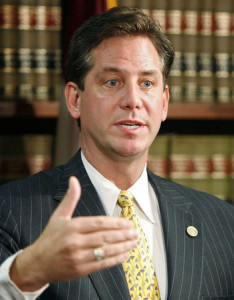 Plagued by persistently low approval ratings, Pennsylvania Gov. Tom Corbett undoubtedly breathed a sigh of relief late yesterday afternoon when Montgomery County Commissioner Bruce Castor announced that he wouldn’t challenge the increasingly unpopular governor in next May’s Republican primary.
Plagued by persistently low approval ratings, Pennsylvania Gov. Tom Corbett undoubtedly breathed a sigh of relief late yesterday afternoon when Montgomery County Commissioner Bruce Castor announced that he wouldn’t challenge the increasingly unpopular governor in next May’s Republican primary.
A former Montgomery County District Attorney now serving in his second term as a county commissioner, the 51-year-old Castor had been contemplating a gubernatorial campaign since last December when he began actively crisscrossing the state meeting with conservative activists and potential donors.
Castor, who spent the past five months depicting Corbett as a clumsy and inept politician who failed to deliver on a conservative agenda, posted his announcement on his Facebook page around 5 p.m. on Tuesday.
“After a great deal of consideration, I have decided not to run for Governor in 2014,” he told his supporters. “I want to thank all those who encouraged and advised me over the last six months. Simply put, my duties as Montgomery County Commissioner, a lawyer with Elliott Greenleaf, and the responsibilities to my family, make a massive undertaking such as running governor impossible for me this election cycle.”
Castor’s departure from the race caught some observers by surprise. Just four days earlier he had posted a story about Corbett’s continuing woes on his campaign website. Written by the refreshingly brilliant sportswriter-turned-political blogger Charles P. Pierce of Esquire, the article carried the headline, “Dead Governor Walking.”
That was precisely the kind of national publicity the GOP didn’t need, said Castor.
In contemplating a potential bid for governor, Castor had been highly critical of Gov. Corbett’s handling of the investigation of child sexual abuse charges against disgraced former Penn State assistant football coach Jerry Sandusky when he was state attorney general — a post that Castor had once actively sought. He was also critical of Corbett’s inability to get legislation through the Pennsylvania General Assembly and the governor’s disappointing failure to deliver the state to his handpicked successor for attorney general last year.
He also doubted that Corbett could be re-elected next year.
During his brief exploratory candidacy, Castor told party leaders and the press that he wanted to make sure that the GOP didn’t repeat the mistake it made in 2006 by supporting a doomed incumbent. That year, Pennsylvania Republicans supported then-Sen. Rick Santorum’s bid for a third term. Santorum, of course, was shellacked in the general election, losing to Democrat Robert P. Casey, Jr., by a staggering 17 percentage points.
A Public Policy Polling survey in March showed Castor trailing Corbett by only twenty points — 43 percent to 23 percent — in a head-to-head matchup. That same poll, which showed Pennsylvania Republicans disapproving of Corbett’s job performance by a margin of 45-43 percent — and that nearly half of the state’s Republican voters preferred somebody other than Corbett as the party’s nominee next year — appeared to provide plenty of running room for an insurgent candidate like Castor.
In bowing out of the race, Castor acknowledged that defeating a sitting governor of his own party would require an almost Herculean task, telling KYW News Radio in Philadelphia that he had encountered “a solid wall of support” for Corbett among party leaders and major donors.
The time wasn’t right to buck that trend, he said.
Castor and Corbett are hardly political strangers. Corbett defeated Castor by nearly 52,000 votes — or by less than six percentage points — to capture the Republican nomination for state attorney general in 2004.



Follow Us